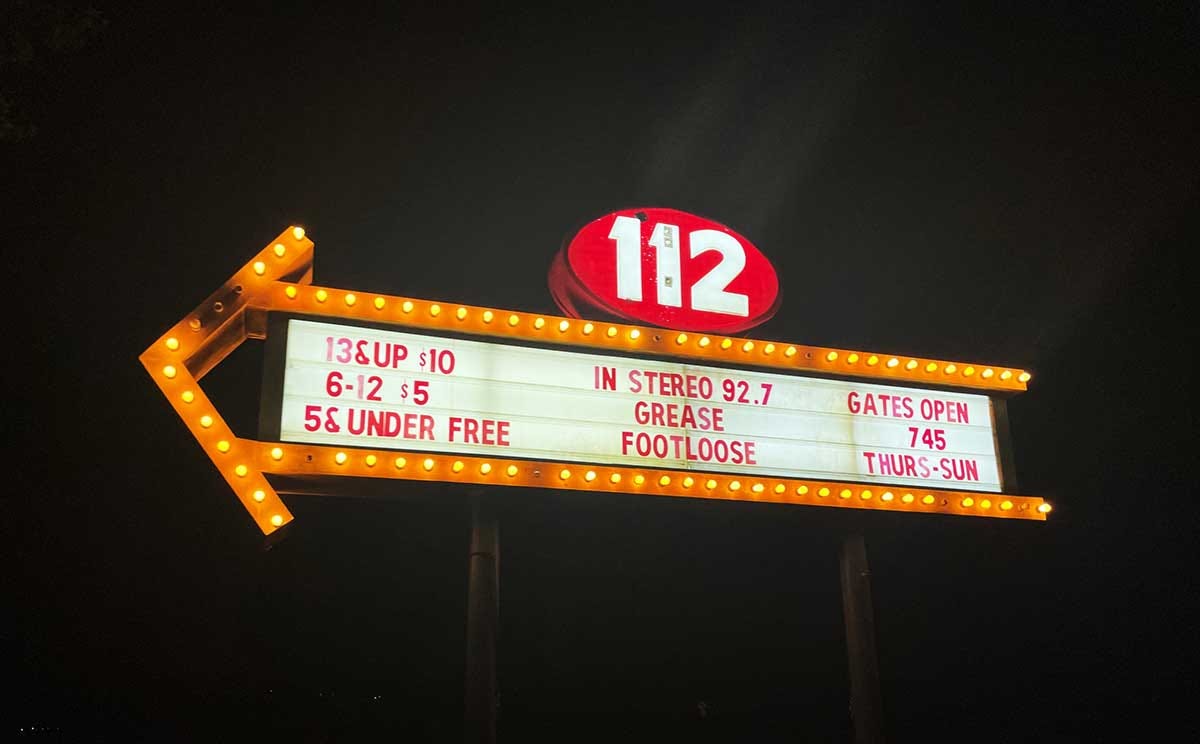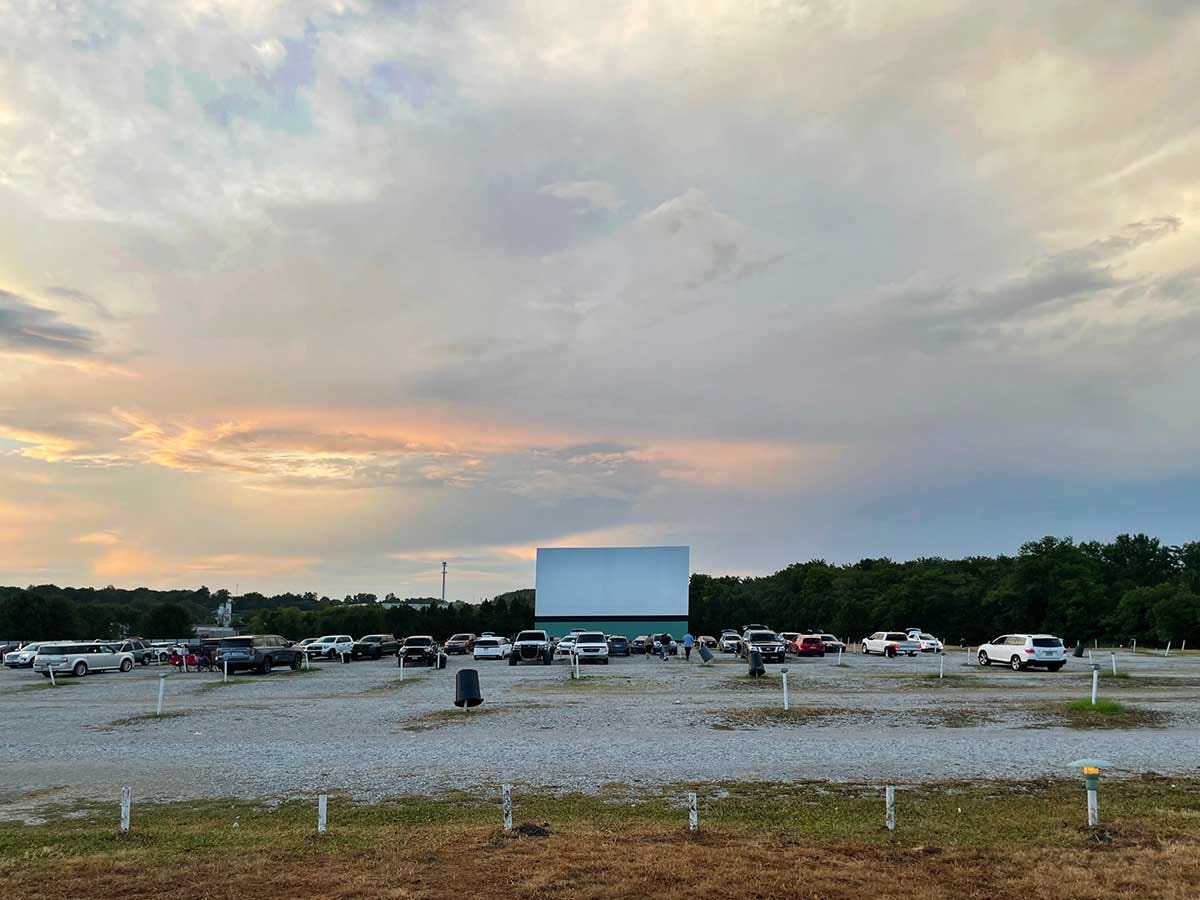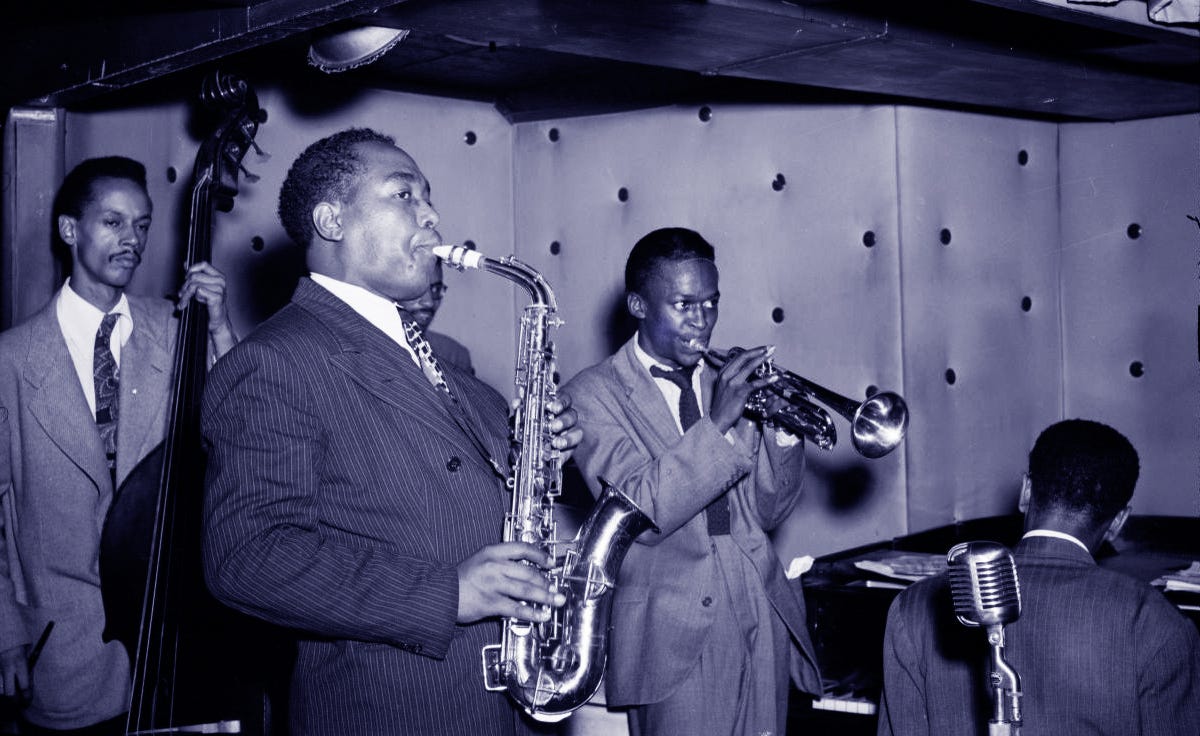IN THIS ISSUE, Michelle Parks takes us to the drive-in for one last summer evening under the stars, Eleanor O’Neal offers the second part of Crompet’s Tale, and Mark Pennington wonders how much the little white dog understands true grit.

Ah, Those Summer Nights
ESSAY
By Michelle Parks
The weekend of July 4, I went to the drive-in to see my favorite movie, Grease.
The 112 Drive-In sits on what was once the outskirts of Fayetteville but is quickly being consumed by progress. For one night, I jumped back in time, immersing myself in this place of nostalgia.
The night felt warm, but nothing like the assault of 100-degree days that marked much of July. On this holiday weekend, fireworks brightened the distant sky every so often. A deer stood in tall grass in the field behind the structure that houses the concessions, bathrooms and projection booth.
The illuminated roadside sign is a beacon to this magical place and a billboard for the weekend’s movies — always a double feature. The drive-in used to charge admission by the carload, but now it’s per person. They’re competing with air-conditioned theaters that boast stadium seating and alcohol sales, as well as streaming services that allow people to sit on their couches in ultimate comfort.
But there’s a special, communal aspect to making the pilgrimage here — as cars and headlights line the long driveway. It’s a chance to be outdoors, in the fresh air, as the movie is projected above vehicle rooftops in the night sky. Children can frolic and expel energy before their eventual collapse.
This form of movie watching brings freedom and independence. The experience is immersive.
My date and I were thrilled to watch Grease and the second feature, Footloose — significant movies from our youth. Grease was the highest-grossing film of 1978, and its soundtrack was the second best-selling album of the year after the Saturday Night Fever soundtrack.

Set in the late 1950s, Grease tells the story of the “greasers” and their girlfriends, and the drive-in is an extension of that era’s growing car culture. After Sandy (played by Olivia Newton-John) abandons him at the drive-in, Danny (played by John Travolta) sings of his heartache in “Sandy.”
In the late 1950s, there were some 4,000 drive-ins across the country, including about 50 in Arkansas. Now only around 300 still operate nationwide.
For 42 years, the 112 Drive-In has remained a constant in the region, yet an increasing rarity. It’s one of the last three drive-in movie theaters in Arkansas — along with the Kenda Drive-In in Marshall and the Stone Drive-In in Mountain View, which both opened in the mid-1960s.
Over the years, it’s been that summer outing for families, friends and couples. They bring in a cooler of drinks and snacks or order from the concession stand — which offers burgers, nachos, popcorn, soft drinks, candy and other treats.
Cars, trucks and SUVs roll into the lot, their tires crunching the gravel. They line up along raised rows, arched and angled toward the screen — with each vehicle’s front or rear facing the screen, depending on how they want to watch the movies. Many set up camping chairs or sit in their front seats.
The original metal box speakers are gone from the posts; now people tune in to an FM station for the movie dialogue and musical score. The employees will jump start any batteries that die.
Like several others, we parked with the rear of the car facing the screen and nestled in a palette of blankets in the back. We grazed on charcuterie tray selections through both movies — and devoured a more traditional Frito pie. We reveled in the moment.
Because we knew that the drive-in's owners had sold this land, and that a new development is planned. There will be no more summers like this here. That made it more precious, bittersweet. We created memories while we could.
Then fate twisted in early August, with the heartbreaking news of Olivia Newton-John's death. I simply adored her. She was larger than life in my childhood. Maybe I imagined myself in that convertible with a crush on a boy, eventually overcoming self-doubt with optimism.
Though I’ve seen Grease countless times, I’m so glad I made the effort to experience it at the drive-in. Maybe it was the best way to say goodbye, even though I didn’t know it was goodbye yet.

After this summer, the 112 Drive-In will only exist in our memories. The last shows are Wizard of Oz and Twister on Aug. 19 and 20, and then Grease and Footloose again on Aug. 26 and 27. These selections seem fitting, as the light dims on the yesterdays.
Michelle Parks is a writer and editor in Washington County, Arkansas.
Drive-in Theaters of the Ozarks
Barco Drive-In Theatre, Lamar, Missouri
Kenda Drive-In, Marshall, Arkansas
Phoenix Theater, Houston, Missouri
Pine Hill Drive-In Theater, Piedmont, Missouri
Starlite Drive-In, Cadet, Missouri
Stone Drive-In, Mountain View, Arkansas
Sunset Drive In Theatre, Aurora, Missouri
19 Drive-In, Cuba, Missouri
21 Drive In Theatre, Van Buren, Missouri
66 Drive-In Theatre, Carthage, Missouri
112 Drive-In Theatre, Fayetteville, Arkansas, for a couple of weeks more.

Crompet’s Tale, Chapter One
PART 2 in a five-part series; read Part 1
FICTION
By Ellen O’Neal
Around their campfire, the rest of the surly mob grew restless as Crompet resumed his story of college days back in 1947 at the University of Pennsylvania when what they really wanted to hear about — his first date — remained absent from the story so far. He picked it up where he had left off.
“I was merry at the tale of the toboggan runs so amusingly told by the fraternity brothers,” Crompet said, “and I raised my voice again over the din of the party and jazz music and told them that their story sounded like something from Molière’s l'Exempt de Tartuffe.”
“What did you say?” asked the first boy over the roar.
The second responded: “It was something about Moe, Larry, and Shemp.”
“And a tattoo,” said the third.
“What? No,” I said as loudly as I could. “I was talking about Molière! Mo...li...ère! He is French.”
“Was he part of the resistance?”
“He was a playwright.”
“On the right, did you say?”
“No, no!”
“Vichy? Was he a fascist?” another asked.
“No, no, he was neither reactionary nor republican,” I said, laughing. “He was a comedian and clown. He told the truth.”
I laughed again. I laughed so hard I nearly fell over, but I waved at them to follow. We bobbed our way through the crowd and into the stairwell so that I could explain without shouting that I had not been talking about the Three Stooges but rather of Molière, the author of The Misanthrope, The Miser, Tartuffe, and more. I thought they would laugh at this miscommunication as well, but they stared at me dumbfounded, as though I were speaking a foreign language.
“Ah,” I said, sizing them up and trying to think soberly. “Molière. Sam Moliére. He works in Hollywood. Wrote the screenplay for Sing a Song of Six Pants, the Stooges’ latest reel. It’s showing at Shankweiler’s drive-in theater up at Camden. Have you seen it yet?”
They burst into laughter, bwahahaha. I was their brother again, and we elbowed our way back into the apartment as the jazz group began playing “How High the Moon.”
Two things struck me. First, I could see the band for the first time, and the drummer looked like Max Roach. The guy on piano like Duke Jordan. Tommy Potter on bass, Miles Davis on trumpet, Charlie Parker on sax. But they didn’t just look like those guys, they were those guys. Parker’s quintet. The Yardbird. Just here in the dining room of this little apartment, jamming all night. How could I have been boxed up with three infernal frat boys in a corner when these hepcats were cutting loose ten feet around the corner from me all night long?
Crompet halted his story and added another stick to their fire. Many years later, Carol checked her notes and found that he really did say “hepcats.” She smiled at the memory of it, such an un-Crompet-like thing to say, and Carol wondered what kind of a beatnik he had been back in the day.
Crompet resumed: “It also hit me square in the soul that something was wrong with me. I was odd or queer or uncommon or some je ne sais quoi, and I was embarrassed by it, ashamed at myself without understanding why. These three normal looking boys knew not Moliere and looked at me as though I were a daft alien from another epoch, another world. I never felt so alone as among that throng of people. As soon as the band flagged, I tumbled out of the apartment, down the flight of stairs and out into the cold darkness of Philadelphia’s sooty, snowy streets. The wet mush of Hamilton street filled my wet shoes, and tears swelled in my eyes. I confronted my foreignness, a lost soul who had at that moment arrived soulless, godless and friendless in his own world.
I suppose I first noticed this isolation in the Army, but I assumed everyone in the Army felt wayward and bereft of communal spirit, save whatever esprit de corps the sergeant pounded into us. But here I stood a civilian and still awkwardly unassimilated by these fellows. I recognized for the first time what the average person had perceived in me all along, that I was weird. But was I to be held apart from the masses, aloof from common experience because I had pursued uncommon knowledge, not to become elite, mind you, but because I loved, truly loved absorbing every iota of thought. And now I was ashamed at my learning, embarrassed to admit the terror inside for having chosen this wrong course in life. The tears came falling out of my head upon the recognition, and it changed my life. I became reticent, more shy, more docile in my interaction. I asked questions in conversation rather than assert any facts at my fingertips, the questions opening a space for approach and forfending reproach. I learned plebeian things like the names of football maneuvers, the makes of automobiles, and weather terminology, all the while avoiding the use of words like ‘plebeian.’
Crompet laughed inwardly at his own joke, self-deprecating and self-serving in one breath. He continued: “I retreated from any public acknowledgement of intellect. I tried to fit in.”
He was animated by now, swirling his left hand in small circles, but he paused. His eyes darted left, and they filled with tears again at this memory of what? An awkward, wayward moment of youth? Or a whole-cloth change of life forever and anon? Was he still alone today, among his fellow bicycle travelers? Carol wondered.
The firelight danced on his still face for that still moment, and each of the bicyclists sitting around the campfire worried where they had asked him to go. Then he recalled where his story was leading and he set off again.
“I was not good at it, at trying to be something I was not,” he said. “I was like a witch trying to hide my crooked nose … but I got better.” He chuckled aloud at this second little inside joke, breaking the somber moment. The surly mob surrounding him gave way to a nervous laughter.
Part 3 of Crompet’s Tale climbs upon the steppes of Mount Olympus and slides into the depths of unmistaken identity.
Ellen O’Neal is a writer working on a novel about America, and “Crompet’s Tale” will probably become part of it.
Chronicles of the Little White Dog
By Mark Pennington
I decided it was finally time to read True Grit, so I started the audiobook (which I still think of as a book on tape). I was reminded that Tom Chaney had to flee Texas because he shot a man's dog and then the man himself, because the dog was barking at Chaney. Perhaps the little white dog should listen along with me.
The dialogue is so Arkansas it makes me homesick. At one point Mattie asks a stable attendant if his teeth were knocked out by Chaney. No, the man says, they were removed by a dentist. "Well, he said he was a dentist." Belief in the possibility that a much more interesting and ridiculous story lies behind every story is one of those folks' most endearing features. As opposed to those parts of the country where they seem to believe that the most amazing things are actually devoid of any charm or color.





